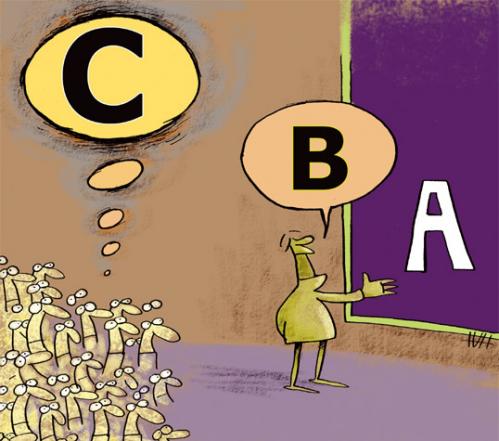 The advance of technology should always make us smarter.
The advance of technology should always make us smarter.
Data and a web of data
When it is related to computing, data is information in a form suitable for use with a computer.
Data owns many merits. Data is honest, objective, and long-lasting. Data is convenient to be connected, shared, copied, manipulated, consumed, transported, bought, and sold. And in general data is inexpensive to be created and stored.
But data is also with some weaknesses. Data does not think. Data cannot interpret itself. Data could be confusing. Data is easy to be abused. And after all data does not produce. Data is consumable goods like grains or coal in contrast to tools such as lathe or electric generator. Data is for the Wall Street traders and retail salesmen to trade in contrast to for the manufacturers to produce.
What is going to be if the Web truly becomes a web of data, or more precisely a web of linked data? It will be a paradise for salesmen and Wall Street traders. The Web becomes a super supermarket. Wonderful! Bravo! Done. A new age of mankind arrives ...
But wait! Is there anything wrong? Imagine a society where the salesmen and traders dominate everything but the producers and manufacturers are second-class, may the society be sustainable? Oh, maybe it is the United States now.
Mind and a web of mind
Mind is the aspect of intellect and consciousness experienced as combinations of thought, perception, memory, emotion, will, and imagination, including all unconscious cognitive processes. This definition is too long. In a short version, a mind is how a human interprets the world, and his result interpretation. In the sense of computing, mind is the methods/procedures for manufacturing data, and the manufactured output.
Mind also has a few merits. Mind is creative, genuine, active, and exciting. Mind flows by itself. Mind produces. A mind never stops interact with the other minds. Mind grows. Mind is alive.
Despite of all the merits, mind has terrible weaknesses too. Mind is subjective. Mind could be selfish or with unspeakable bad intention. Mind could be deceived. It is more difficult to share or connect minds because they could own their own identity that claim to be uncompromisable.
A web of mind is like a world of factories. Everybody debates, competes, and even fights each other. Such a world is like a mess such as a troubled third-world country you can imagine.
Contrast
But there is a very interesting discovery if we compare the two very different Webs more carefully. In the world of the data web, humans are outsiders, observers, or at most the communicators to the world. Or let's speak the fact in another way, humans are not part of the world though they do business with the world. On the contrary, in the world of the mind web, humans are part of the world because it is THEIR mind and it is THEM who fight each other on such web in contrast to through such web. We are becoming part of the Web.
Such a distinction is crucial since the goal of our Web development must not be teaching computers to think and make them smarter and smarter. By contrast, the right and indeed ever-lasting goal for any of the human creation must be to make us, human beings, be smarter and smarter over time. We should be using computers to help humans think and create value instead of the opposite. When we are part of the Web, we become smarter when the Web gets smarter. When we are outside of the Web, we tend to be more stupid when the Web gets smarter. Only if we can correct our intention of Web development to the right track, the eventual enthusiasm of the general public will be invoked into this, possibly great ever, achievement of all mankind.
We need data and we need mind. The future of World Wide Web demands the both, simultaneously and being balanced.
In the last year, I witnessed the final death (corrected by the founder, it was in hibernation instead of being given up) of an early-born baby that donated itself to the mind Web. It is sad but the hopes remains. Myself have learned many lessons for this attempt, and I am certain the founders must have learned more. However, I am fully confident that it is still the correct path forward. The next footstep after Netscape, Yahoo, Google, Apple, and Facebook will be on this path. Human and human mind being the driving force in (instead of "to") the Web is the next great invention about the Web.







